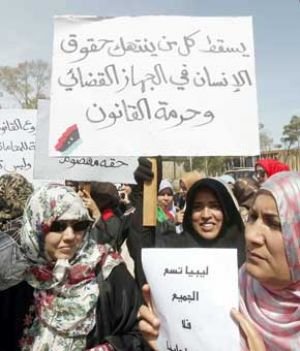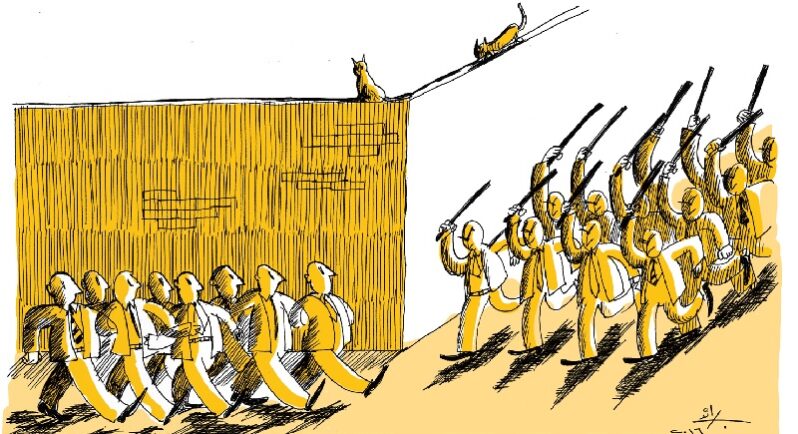Libya’s Judiciary: The Gender Ceiling (II)

In the second of a two-part series on women judges in Egypt and Libya, Menna Omar chronicles recent attempts in Libya to incite religious law as a means of overturning the right to hold judicial office.
It seems that the transitional phase in Arab countries regarding judicial appointments will be characterized by a policy of exclusion. In Egypt, a proposition to reduce the retirement age from 70 years to 60 or 65 years was a means of driving out senior judges. In Libya, women have been heading judicial posts since 1989 when Article 1 of Law No. 8 issued in that year stipulated that “women have the right to hold office in the judiciary, public prosecution and case management, under the same regulations applied to men”. Today, 25 years later, the constitutionality of this law is being challenged.
Grounds for Challenge: The “Deficiency” of Woman Rulings
Calling for the exclusion of women from the judiciary took place after a woman filed for divorce and her case happened to be presided over by a female judge. In a vengeful reaction against all women, the husband claimed that the judge should not be handling the case by virtue of Article 1 of the 2011 Constitutional Declaration. The said article stipulates that Islamic Law is the main source of legislation. As a result, the judge recused herself from the case and a male judge was assigned to it. However, the husband went further and filed a lawsuit before the Supreme Court of Libya to prove the unconstitutionality of the 1989 law. In his appeal’s claim, the husband’s lawyer pleaded all views opposing the idea of women holding the office of a judge. In addition, the lawyer presented the supporting views, as well as their refutations, while referring to -as one would expect- Islamic Law.
Given that the initial lawsuit was a divorce case, the plea for the barring of a female from assuming a judicial post was based on the inability of a woman [according to Islamic Law] to authorize or terminate a marriage contract. However, the plea left out the fact that a woman can end a marriage contract by divorcing herself or by invoking khula, the act of divorce at the woman’s instance in return for forfeit of compensation.
Moreover, the statement of claim clearly used discriminatory language in order to prove that women cannot act as judges due to their “lack of reason”. The petitioner relied on the [Quranic] concept of Male Guardianship (Qawamah) and stated that, “men are the protectors and maintainers of women”. He cited the verse: “And due to the wives is similar to what is expected of them, according to what is reasonable. But the men have a degree over them.” The lawyer also referred to the [Islamic] rule that a woman’s testimony is not counted unless accompanied by a man’s. The petitioner further argued that it is not appropriate for a man to be judged by a woman as this would be degrading to his sense of honor: as if to imply a man’s sense of honor lies in the control he has over a woman, his condescending attitude towards her, as well as a need to occupy a higher-ranking status. This same language was adopted again later in the document. For after stating that women “distort words and muddle meanings”, the appellant reaffirmed the inappropriateness of men being judged by women due to women being “deficient in reason and religion”. He also pointed out that a woman should not participate in meetings or mingle with men and that her “voice”, as well as her “figure” might be a “cause of temptation”.
In a significant development that took place on June 9, another lawyer filed a second constitutional appeal contesting Article 1 of the 1989 law. This time, the lawyer was acting on behalf of four female lawyers! It is as if the plaintiffs’ lawyer wanted to prove that excluding women from the judges’ bench is first and foremost a demand by women lawyers who suffer the consequences of errors committed by their fellow women [judges], due to the latter’s natural tendency to misjudge. The second lawyer adopted the same arguments listed in the statement of claim of the first appeal. However, his appeal plea followed a different demarche by trying to prove the aberration of female judges through two examples of rulings by the latter; noting that a woman’s confusion is assumed given her emotional nature and overall susceptibility while a man’s mistake is just a possibility. The lawyer listed other arguments. These include the claim that a woman, inspecting a crime scene in her role of public prosecutor, cannot go out alone at night without a Mahram (unmarriageable male kin). This second appeal case is an indicator that there is either premeditated coordination among the different plaintiffs, or a possible viral effect.
The Libyan Judges Organization: Intervention in Defence of Women
In response to the first appeal case, the head of the country’s General National Congress and the Prime Minister submitted a memorandum to the court, followed by a memorandum by the Minister of Justice. What is notable, however, is the intervention by the Libyan Judges Organization, with a number of its women judge members enlisting themselves as third parties to the case given that the ruling of the High Court will affect their legal status. We should note here the eagerness of the organization in defending a woman’s right to become a judge in contrast to the Egyptian Judges' Club refusal to admit of such a right.
Comparing the memorandum issued by governmental authorities to that by the organization shows that the latter limited its defence to two types of arguments. The first concerns formal procedure. Examples include the claimant’s loss of his status as a plaintiff as a result of the judge recusing herself from his wife’s case, and the prohibition of directly filing a suit before the Supreme Court. The second concerns technical matters. Examples include the claim that the provision designating Islamic Law as the main source of legislation only applies to legislations issued after the Constitutional Declaration and that Libya’s commitment before the Committee on International Human Rights that “international conventions and legislations that Libya is a party to becomes part of national legislations.” The organization did not go into Islamic Law issues, seemingly trying to avoid appearing partial towards any one school of Islam.
In contrast, the head of the National General Congress and the Prime Minister pointed out in their memorandum that some schools of Islamic Law allow women to work, while others do not. Therefore, they argued that “the legislative authority can, per its discretion, adopt either view of the situation at the time of passing its laws”. In 1979, the High Administrative Court in Egypt adopted the same analysis but to justify a position that contradicted that country’s State Administrative Council. The Egyptian court justified its rejection of women in judicial offices by referring to Islamic schools that oppose the matter. The Libyan memorandum, therefore, appears to be using Egyptian jurisprudence to impose a reading of Islamic Law that is more allied with women’s rights.
In sum, we can only hope that the Supreme Court will reject the case before it, scoring a victory for women’s rights to hold judiciary offices, and encouraging other Arab countries to follow suit. Otherwise, handling the case in a manner that leads to purging women from the judiciary is a terrifying thought given all the consequences of such a decision.
This article is an edited translation from Arabic.



